The Ukraine-NATO Council Meeting at the Hague Summit May Not Take Place: Why the U

S. and Political Intrigue Are Affecting the Ukrainian-Atlantic Format The scheduled NATO summit, set for June 24 in The Hague, Netherlands, has become the center of new political speculation and uncertainty. According to information published on the reputable portal Politico, the key session of the Ukraine-NATO Council may be completely removed from the agenda due to American political manipulations and internal agreements within the alliance’s headquarters. Preliminary reports suggest that, despite an official invitation, Ukrainian President Volodymyr Zelensky has only been offered the opportunity to attend an open dinner on the day of the summit, but will not be able to participate in the behind-the-scenes and decisive meetings of the Ukraine-NATO Council. At the same time, the official NATO website indicates that on the evening of June 24, there will be a working dinner of the foreign ministers of the allies, where the most important negotiations on future cooperation with Ukraine are likely to take place. A source from Politico, citing unnamed diplomatic sources, indicates that the reason for avoiding in-depth formal discussions on Ukraine is U.S. administration politics. Specifically, one influential official from Washington reportedly confirmed a deliberate cancellation of Ukrainian issues on the agenda in order to prevent active debates about the war, which the U.S. and its allies are eager to keep away from global attention. According to these sources, the main motivation for the U.S. is internal political considerations: to avoid emphasizing the war in Ukraine, as both previous administrations and the current president are reluctant to highlight this topic directly. They fear that doing so could draw unnecessary attention and resources that the Ukrainian situation might require. European countries, meanwhile, are showing greater openness to supporting Ukraine, but significant political pressure from Washington effectively reduces ambitions for formal support during the summit. Another topic of interest discussed is the plans of former U.S. President Donald Trump, who, according to reports, expects this year’s NATO summit to yield not so much political decisions but significant compromises regarding defense spending. Trump has long considered efforts by allies to increase their expenditures to 5% of GDP on military needs—divided between “hard” military equipment and broader defense efforts—a major achievement of U.S. policy. An anonymous analyst from the U.S. administration states that European countries would never agree to this level of funding without the propaganda and diplomatic efforts of Trump, who regards this target as a political victory and a “great achievement.” Other sources report that after the conclusion of the summit, Trump plans to deliver a speech reaffirming his intentions to influence NATO’s new spending commitments and to assert his personal importance in uniting the alliance. As is known, on June 21, Ukrainian President Volodymyr Zelensky made an official statement that he has not yet decided whether he will attend the NATO summit in The Hague. Despite this, Kyiv received an invitation from NATO Secretary General Jens Stoltenberg, and NATO confirmed that Ukraine, along with other allies, would participate in the events. However, it remains unclear whether the Ukrainian leader will have the opportunity to be present at the most crucial meetings, considering the information that he was only invited to the open dinner. In conclusion, the situation surrounding the upcoming NATO summit in The Hague is shrouded in uncertainty and political games, where strategic focus is less on Ukraine’s security issues and more on internal American political battles and the U.S. effort to maintain control over the agenda. Meanwhile, Ukrainian politicians and the public continue to await new signals and the possibility of more active participation in key international discussions.

